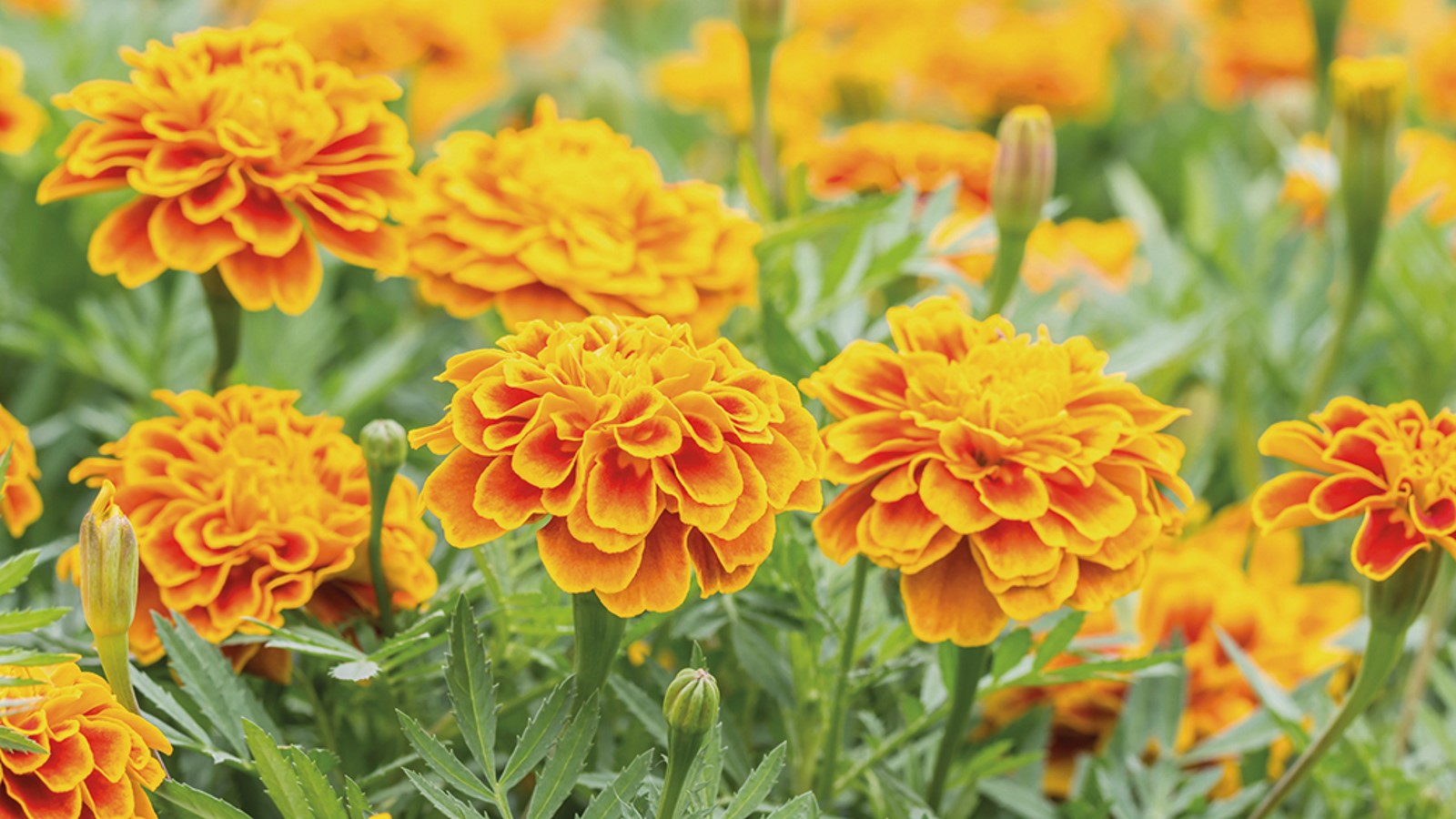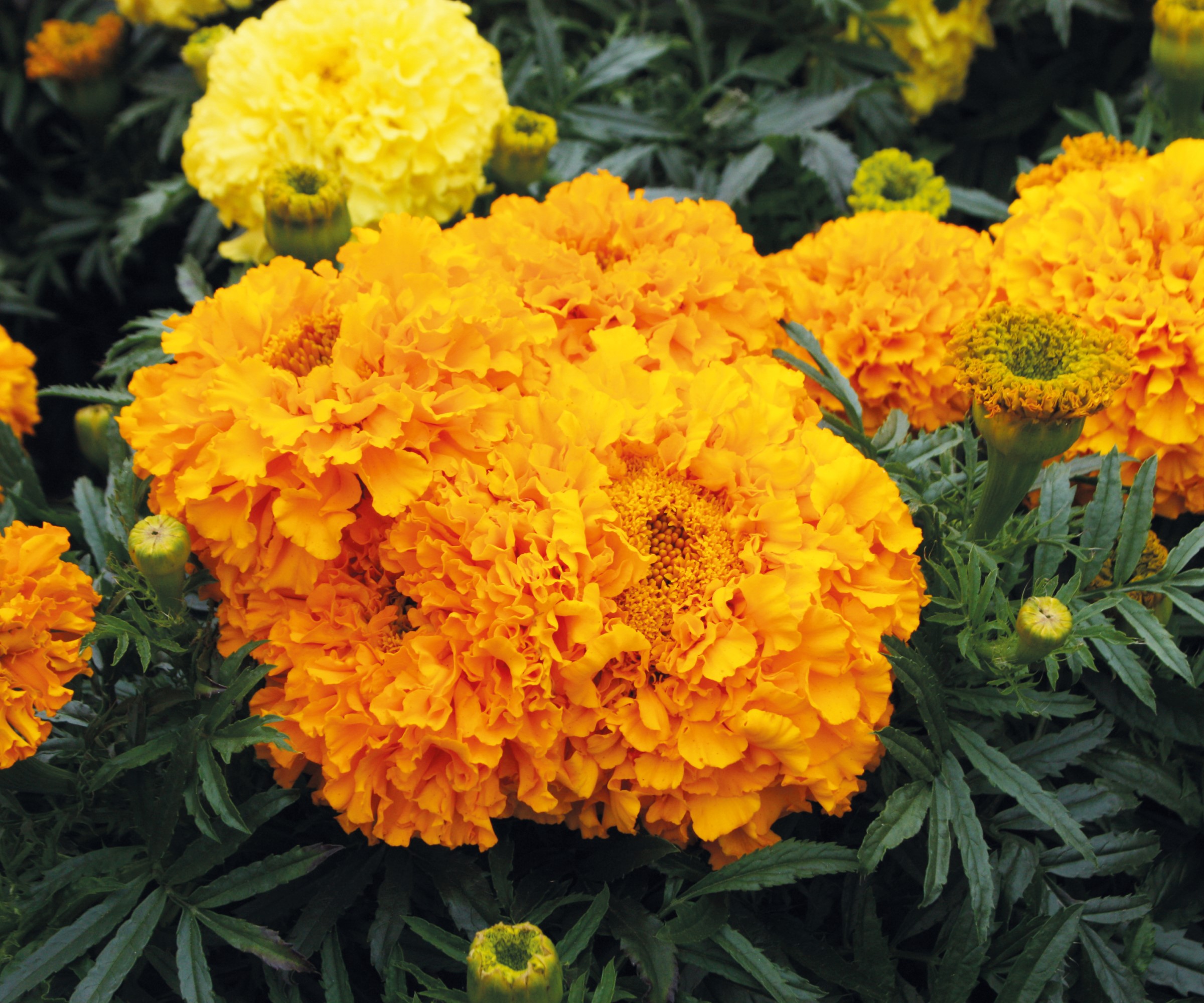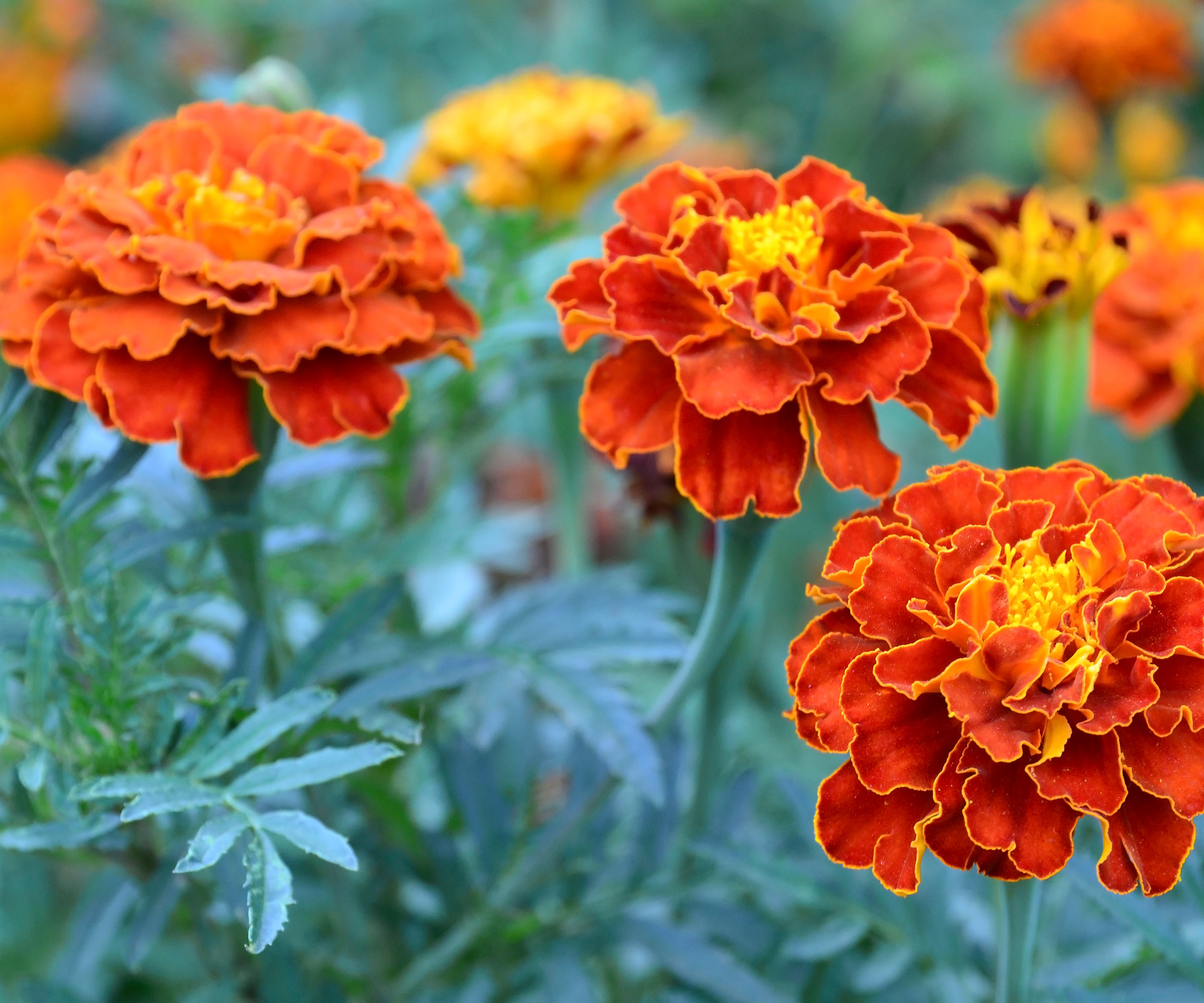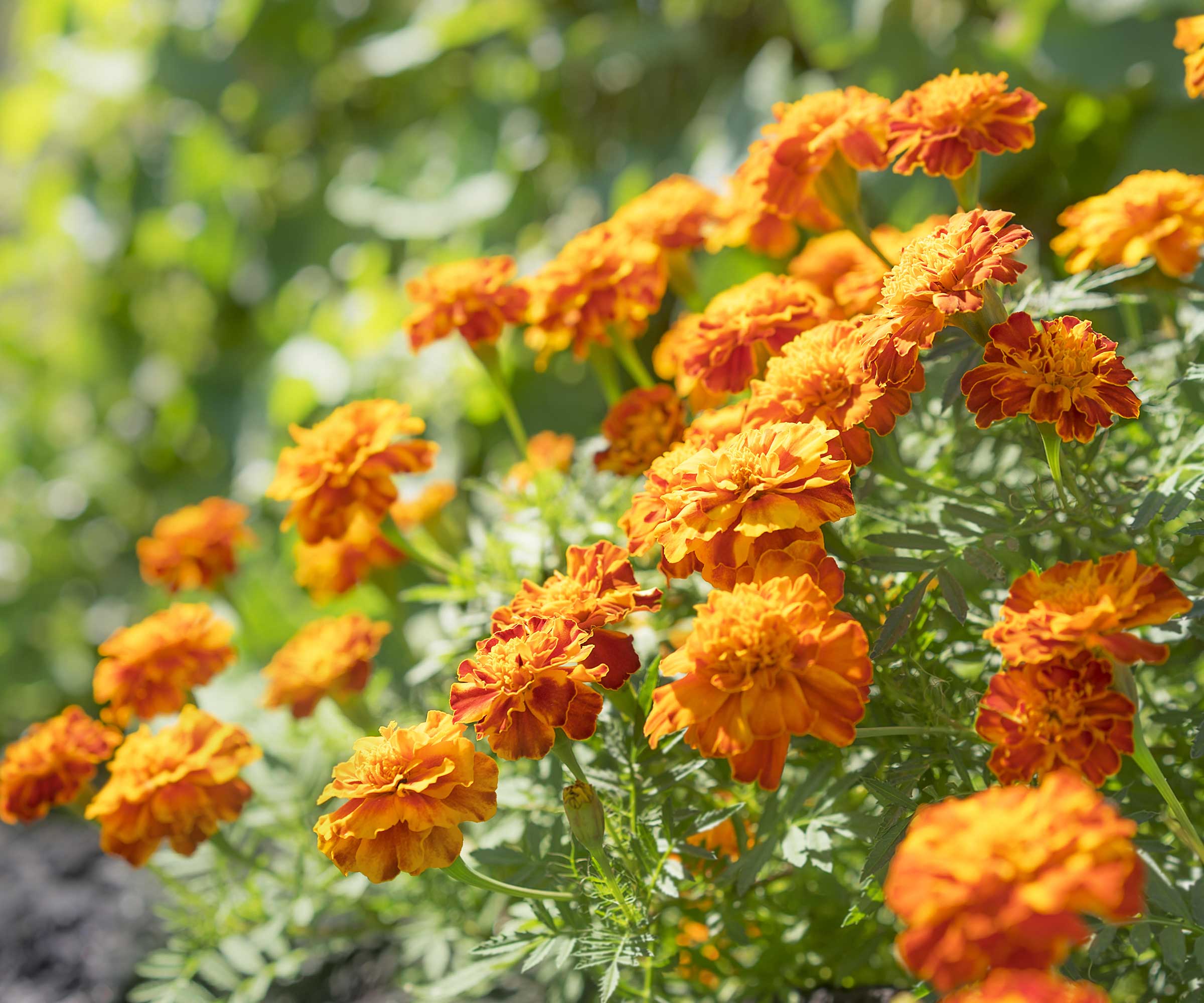Do marigolds keep bugs away? How to use these pungent plants to deter pests
Discover the natural pest deterrent benefits that come with the colorful and abundant blooms of marigolds and how they can be used in your garden


The marigold (Tagetes) is a prized plant that is highly regarded by gardeners. Not only do they come in a variety of sizes and bright colors, but they are well-known for their ability to repel a wide range of garden pests.
I grew marigolds in the kitchen gardens I worked in, as their properties for repelling bugs and pests were hugely beneficial. I grew them in the greenhouse, especially among tomato and pepper plants, but also dotted clumps of marigolds in outdoor vegetable beds as a deterrent for lots of pests. They were also annual features at a historic garden I worked in, selected there primarily for their aesthetics in an ornamental parterre.
If you want to know how to grow marigolds so you can take advantage of their ability to keep bugs away, then rest assured that they are simple to grow. They can be grown from seed, or plants can be purchased from garden centers or online, and marigolds can bloom for months throughout the summer or fall.

Marigolds are very fast-growing plants and have a long blooming season
What do marigolds repel?
Marigolds are one of the best pest-repellent plants you can put in a backyard. They emit a strong aroma and it is that pungent scent that is responsible for deterring insects and bugs. Therefore it is essential that when you are planning to grow marigolds you get a strong-scented variety, rather than more modern hybrid varieties that do not possess that pungent aroma.
It is widely known among gardeners that the smell of marigolds can be a good fly-repellent plant, against the likes of blackflies and whitefly, and also a good way to get rid of aphids. That strong scent also makes it a great mosquito repellent plant and wasp-repellent plant.
Brock Ingham, an experienced gardener and editor of Bigger Garden, explains that the distinctive scent of both French marigolds (Tagetes patula) and African marigolds (Tagetes erecta) comes from a chemical compound called thiophene.
He says: ‘Thiophene is an essential oil that acts as a natural insect repellent. When insects come into contact with the strong odor emitted by marigolds, they tend to stay away from the area, reducing the chances of infestations and damage to nearby plants.
‘French marigolds have a strong, pungent scent that repels a wide range of insects. This odor is particularly effective in deterring pests like aphids, whiteflies, mosquitoes, and nematodes
‘African marigolds also have a distinctive fragrance, but their scent might not be as powerful as that of French marigolds. However, they are still effective at repelling certain insects like spider mites.’
In addition to the bug-repelling smell that marigolds emit, the annual plant also has a trick up its sleeve under the surface. Some varieties of marigolds produce toxic chemicals from their roots that can combat root-knot nematodes and also inhibit the hatching of other nematode eggs.
However, this trick against nematodes needs the marigolds to be planted months before other plants that it can benefit, or even be in the ground the year before. It is important to do some research to make sure you pick a type that is successful against nematodes, though it is regarded that French marigolds are the most effective.
Buy Marigold Seeds and Plants from Burpee

Brock has been gardening and landscaping for over a decade, from growing rare plants indoors to tending to a list of no-mow ground covers. He shares his passion for gardening through his website, Bigger Garden.

Marigolds come in warming shades of red, orange, and yellow
How do you use marigolds as insect repellent?
Marigolds are hugely versatile plants that can be used in a variety of situations. They can work as part of flower beds, bring beauty to vegetable gardens, or make great flowers for pots in full sun. Their ability to thrive in such a plethora of conditions and circumstances makes them a great option for companion planting a long list of vegetables, including beans, tomatoes, cucumbers, peppers, squash, or eggplants. They can also be used as companions for fruit trees, and berries, or as strawberry companion plants.
Vineta Jackson, editor-in-chief at Grow Happier Plants, says that she has found marigolds to be ‘a fantastic natural pest deterrent alongside other preventive practices’ as part of her organic gardening regime.
‘Marigolds work best planted densely around garden perimeters or between crops as living insect repellents. Cluster them near plants susceptible to aphids and nematodes like roses or tomatoes to maximize protection.’
To effectively use marigolds to get rid of bugs, it is important to be proactive and plant marigolds on their own or in clumps next to the plant you are trying to protect. The companion plant needs to be put in early and before the insects are active to have full effect. A plant already covered in pests will not be impacted by a marigold being reactively placed next to it. Marigolds can be planted singularly, in clumps, or in rows between edibles to provide protection.
It is good thinking to start marigold seeds indoors at a time to ensure that plants are ready to go into their final position at the same time you are planting the plant you want to protect. As marigolds are cheap and easy to grow from seed, and inexpensive plants to buy, you could successionally grow them to have a steady supply of pest-repellent plants throughout the summer season.
As well as being a companion plant, marigolds can also be utilized as trap plants for pest control. This method sees the trap plants being grown with the intention of luring particular pests away from other plants. For example, marigolds can be used as a trap plant to help get rid of thrips as they can attract thrips and draw them away from other more important plants.

Vineta Jackson is the founder of the websites Grow Happier Plants and The Handyman's Daughter, which reach over 500K readers per month.

Clumps of marigolds can be put between crops as natural insect repellents
Which marigold is best for insect repellent?
There are three main types of marigolds commonly seen in gardens, namely French, African, and Signet marigolds (Tagetes tenuifolia). African marigolds are the largest and reach heights of three or four feet, while French marigolds tend to grow up to 12 inches tall and Signet types are usually under six inches.
It is regarded that French marigolds have the strongest scent, making them ideal for repelling a large variety of insects. Vineta Jackson adds that it is also French marigolds that are best at repelling nematodes too, however, the other types also do have beneficial uses in the garden.
‘Of all varieties, French marigolds contain the most effective nematode-repelling compounds in their roots. Interplanting them has helped me combat destructive root nematodes without chemicals,’ she says.
‘Beyond French marigolds, other varieties like tall African or petite Signet marigolds can deter above-ground insect pests. Their potent scent confuses insects. Exploring colors and sizes create a dynamic protective border.’
FAQs
Do marigolds deter slugs?
Slugs are not deterred by marigolds, in fact, it is the opposite and slugs are actually attracted to the plants. If you are looking for how to get rid of slugs, or planning slug control methods, then planting marigolds will not do the trick. Marigolds can be used as a trap plant to attract slugs away from other plants, but they will actively not deter slugs. There are many slug-repellent plants that can be used in backyards, with pungent aromatic herbs like rosemary and lavender good at being used as barriers to protect other plants from slugs.
As marigolds come in differing heights and in shades of yellow, orange, and red, it opens up the real possibility to mix and match marigolds as part of your backyard ideas. Not only can they help create beautiful beds and borders but you can take advantage of the countless benefits they offer in keeping bugs away from other plants. They are truly stars of the garden.
Sign up to the Homes & Gardens newsletter
Design expertise in your inbox – from inspiring decorating ideas and beautiful celebrity homes to practical gardening advice and shopping round-ups.

Drew’s passion for gardening started with growing vegetables and salad in raised beds in a small urban terrace garden. He has worked as a professional gardener in historic gardens and specialises in growing vegetables, fruit, herbs, and cut flowers as a kitchen gardener. That passion for growing extends to being an allotmenteer, garden blogger, and producing how-to gardening guides for websites. Drew was shortlisted for the New Talent of the Year award at the 2023 Garden Media Guild Awards.
-
 A $170 limited-time discount makes this the most affordable Dyson cordless vacuum on the market right now
A $170 limited-time discount makes this the most affordable Dyson cordless vacuum on the market right nowYears after its release, the Dyson V8 still impresses us with its features and power
By Dan Fauzi Published
-
 Victoria Beckham has a unique formula for perfect bedding: 'Very expensive sheets and cheap pillows' – you can follow her example from $15
Victoria Beckham has a unique formula for perfect bedding: 'Very expensive sheets and cheap pillows' – you can follow her example from $15Victoria revealed she goes for crisp, white bed sheets and pillows with neck support from Target – and you can shop similar buys at an ultra-low cost
By Hannah Ziegler Published